
Head of Online Medical Content

Audiology Expert

Travelling with Hearing Loss and Hearing Aids
Advice and tips on how to get the most out of your holidays and journeys
Overview | Can you travel with hearing aids? | What to pack | Travelling tips | Protecting your hearing aids while travelling | Conclusion
Last Hearing Aid UK Update:
Overview
Planning a trip but worried about managing your hearing aids whilst away? With a bit of preparation, travelling with hearing aids is perfectly straightforward.
This guide covers everything you need to know - from navigating airport security to protecting your aids from sand and humidity - ensuring your hearing aids keep working brilliantly wherever your journey takes you.
Travelling with hearing devices
Travelling with hearing aids requires preparation: pack extra batteries, cleaning tools, and a storage case. Inform the airline staff for assistance with hearing announcements.
Keep hearing aids on during security checks. Download relevant apps for travel updates and use noise-cancelling headphones for comfort during flights.
Can you travel with hearing loss and hearing aids?
Yes! Travel is an adventure that opens doors to new destinations, experiences, and opportunities – we don’t believe hearing loss should hold you back from these experiences.
We understand that travelling with hearing loss and hearing aids, whether in the UK or abroad, can present a unique set of challenges.
This article will equip you with all the information, tips and tricks to ensure your travel plans are smooth sailing.
We take a look at what assistance is available and how to make the most of it, navigating airports, flying with hearing loss, going on a cruise with hearing aids, using trains, protecting your hearing aids and most importantly, getting the best out of your travels.
The reality is that with a bit of planning, travelling with hearing aids is perfectly straightforward. We've helped thousands of people prepare for trips abroad, and the consistent feedback is that once you know what to expect, it's far less daunting than you might think.
What to pack when travelling with hearing aids
Whether you are travelling with hearing loss in the UK or abroad, here’s our essential list to pack, no matter where your destination or means of getting there:
Spare batteries: Always carry spare batteries with you when travelling. You may need to change the batteries during your trip, so it's essential to have extras on hand.
Pack more than you think you'll need - at least double your usual supply. Batteries can be surprisingly difficult to find in the right size when you're abroad, and you don't want to spend your holiday hunting for them in unfamiliar pharmacies.
Cleaning kit: Pack a small cleaning kit with a brush and a soft cloth to keep your hearing aids free from debris, earwax, and moisture. Different climates affect earwax consistency - you might find you need to clean your aids more frequently in hot weather.
Dehumidifier: A portable dehumidifier can be invaluable, particularly when travelling to humid destinations. It helps remove excess moisture from your hearing aids, reducing the risk of damage.
This is especially important for Mediterranean or tropical holidays. A small portable dehumidifier takes up minimal luggage space but can save you from costly repairs.
Storage case: Invest in a sturdy, protective storage case for your hearing aids. This ensures they are safely stored when not in use, protecting them from potential harm.
Replacement parts: Bring essential replacement parts like earmolds, domes, or tubes, plus spare wax guards and filters if your hearing aids require them.
These components can sometimes wear out or get damaged, and having spares on hand can prevent disruptions whilst away, as they may be hard to find on your travels.
If you're not sure what spares to take, give us a call before your trip - we can advise on what's essential for your specific hearing aid model.
User manual: Keep a digital or printed copy of your hearing aids' user manual in your travel kit. It can be a handy reference if you encounter any issues while on the road. Better yet, photograph the key pages on your phone - that way you'll always have them to hand.
Travel hearing aid charger: If your hearing aids are rechargeable, a travel charger will ensure they are fully charged on the go so you don't miss out on conversations or experiences due to a flat battery.
Check the voltage requirements if you're travelling outside the UK - most modern chargers work with international voltage, but it's worth confirming.
Remote or smartphone app: If your hearing aids are compatible, ensure you have your remote control or smartphone app ready to go with you. These tools can help you adjust settings and manage your hearing aids on the go.
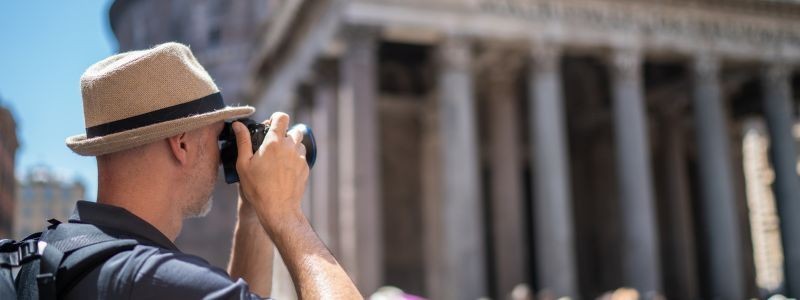
Travelling Abroad with Hearing Aids
Flying With Hearing Loss
Tips for navigating the airport and plane flight
Travelling by air with hearing loss can be a smooth and enjoyable experience with a bit of thoughtful planning. Begin by researching different airlines and their accessibility services.
Each airline has its own set of services and designated assistance teams to aid passengers with disabilities, including those with hearing loss.
Explore their websites or contact their customer service to learn about the specific accommodations they offer.
When booking your flight online, many airlines provide an option to request assistance during the reservation process. This is typically found under the 'Manage My Booking' or 'Special Assistance' section of their website.
The process may vary slightly from one airline to another, so it's advisable to familiarise yourself with the booking procedure of your chosen airline.
When requesting assistance, be sure to specify your needs related to your hearing loss. This might include the need for visual alerts, written communication, or additional support during boarding and in-flight announcements.
Some airlines offer pre-boarding assistance for passengers with disabilities. This allows you to board the plane ahead of the general passengers, providing extra time and support for settling in and stowing your carry-on items.
This is genuinely helpful - it means you're not trying to hear instructions in a noisy queue, and you have time to settle in without the rush.
Choose your seat strategically. You may prefer a seat closer to the front of the plane, where it's generally quieter and communication with flight attendants can be easier. Window seats can be particularly good if you lip-read, as you can position yourself to see the cabin crew more easily.
Can I pack hearing aid batteries in my hand luggage?
Yes, when flying with hearing aid batteries, you can pack them in your hand luggage. In fact, it's a good practice to keep hearing aid batteries in your carry-on bag rather than placing them in your checked luggage.
It's advisable to keep hearing aid batteries in their original packaging. This helps airport security personnel identify them more easily during screening. Additionally, for ease of security, keep them in a clear, resealable bag.
Please note: international travel with hearing aids can differ from country to country. While hearing aid batteries are generally allowed in hand luggage, it's a good idea to check the specific regulations and procedures of the airline or airport at your departure location, as rules may vary in different countries.
Tips for dealing with hearing impairment at the airport
Each airport will also have its own website you can check for accessibility information and take advantage of these services; they are there to make your experience as easy and as enjoyable as possible.
Most airports are fitted with induction loops, ideal for those with hearing aids with telecoils. They are usually found throughout the airport and look for signs showing the 'sympathetic ear' symbol.
UK airports are generally excellent for this - Heathrow, Gatwick, Manchester, and most regional airports have comprehensive loop systems throughout their terminals.
These can be helpful for communicating with staff behind counters or for boarding announcements made over loudspeakers, which can be hard to pick out from the bustle and noise of a busy airport.
Although we all usually travel with our mobile phones, if you find yourself caught without battery, some airports also have text pay phones or payphones that are adapted for hearing aids, ideal for making further arrangements.
Additionally, some airports, such as Heathrow, make use of SignLive. Accessible 24 hours, Signlive provides online video interpreting services allowing deaf passengers to communicate with airport staff by using an app which connects them to a qualified British Sign Language interpreter within seconds.
Make sure to download the Signlive app before you leave for the airport; this will help in avoiding any technical problems. If you find yourself requiring extra help, keep an eye out for assistance in host areas, where staff will be available to solve any unforeseen problems and be happy to help.
What happens to my hearing aids at airport security?
Can I wear hearing aids through airport security? Yes, you can wear hearing aids through airport security. Hearing aids are medical devices, and usually, security personnel are aware of this.
In fact, it is advised that you keep your hearing aids in place during the security screening process to ensure clear communication and avoid misunderstandings. When you approach the security checkpoint, remember to inform the agents that you are wearing hearing aids.
A simple "I'm wearing hearing aids" as you approach is sufficient - security staff are very used to this. In most cases, security personnel are accustomed to dealing with travellers who wear hearing aids and will do their best to ensure a smooth and respectful screening process.
The key is to be prepared, informed, and communicative to make the process as easy as possible. However, it's a good idea to check the specific regulations and procedures of the airport or security agency at your departure location, as rules may vary in different countries.
Tips for on the plane
If you are travelling solo with hearing loss, it's important to inform airline staff and flight attendants who can provide you with necessary alerts and assistance. Additionally, consider informing your seatmate, who can inform you of important announcements in case of an emergency.
A brief "I wear hearing aids and might not catch all announcements" to your neighbour usually results in helpful cooperation if needed.
Many airlines offer closed captioning for safety announcements on their in-flight entertainment systems. If available, make use of this feature to read safety instructions and important information. It's essential to understand the safety procedures, so you are well-prepared in the event of an emergency.
Can you wear hearing aids on a plane?
Yes, however, if your hearing aids are Bluetooth compatible, remember to set them to aeroplane mode when instructed to do so by the flight crew. Similar to mobile phones, this will ensure that your hearing aids do not interfere with the aircraft's communication systems.
Most modern hearing aids have a simple aeroplane mode option in their app - set this before boarding to avoid any concerns.
Can I take my hearing aid charger on the plane?
Yes, you can take your hearing aid charger on a plane, and it's a good idea to keep it in your hand luggage so it's easily accessible. You don't want your hearing aids running out or low on charge if there are unexpected delays.
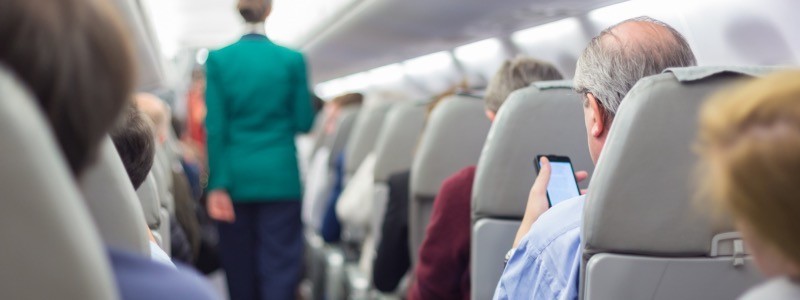
Travelling with Hearing Loss
Going on a cruise with hearing loss
Can I take my hearing aids on a cruise?
Yes, many cruise lines are well-equipped to accommodate passengers with various disabilities, including those with hearing impairments. Here are some tips to ensure a smooth and enjoyable cruise experience:
Inform the cruise line: Make sure to inform the cruise line of hearing impairments; this is important not only for your enjoyment of the cruise but also in emergency situations. Do this at booking stage if possible - most cruise lines have accessibility teams who can arrange everything in advance.
Visual alert systems: On most cruises, you can be provided with a wireless visual alert system and/or text phones via which the crew can inform you of any emergencies or announcements that may affect you.
Induction loops on board: Again, plan ahead and check all accommodations available, such as hearing loops, which are usually available at help desks and around the ships for announcements.
Hearing support systems: Theatres and venues on board will also often supply infrared hearing support systems with compatible headsets. Once at the venue, it is important to speak with the staff who will direct you to where to sit to get the best results from the equipment.
Arrive slightly early for shows to give yourself time to collect and test the equipment - it's much less stressful than rushing.
Cruises can be a fantastic way to explore different destinations and enjoy a variety of onboard experiences. With proper planning and clear communication with the cruise line, you can have a memorable and comfortable cruise whilst confidently managing your hearing loss.

Train Travel with Hearing Aids
How to get the most out of your train journeys
What assistance is available when travelling by train with hearing loss?
Passenger assistance is available via your rail provider. When booking, contact their customer support to find out what they offer. Accommodations can include using Signlive on board, trains are usually equipped with hearing loops, and companies are now allowing hearing dogs on board their trains.
You might also find it helpful to download the Passenger Assistance app. The app allows you to inform the company of your journey and send your request directly to the train operator, who will arrange assistance for you.
Additionally, if you are a resident of England, Scotland, or Wales and are either registered as deaf with your local authority or use hearing aids, you are eligible for a Disabled Person's Railcard. The cost of this card is £20 for one year or £54 for three years. The card offers a third-off discount on most adult rail fares for travel on the National Rail network in Great Britain.
It will also allow you to save money for a friend or family member, as, if they are travelling with you, they can also get a third off their rail fare. To prove you qualify for a Disabled Persons’ Railcard, you’ll need to show evidence that you are registered as deaf or use a hearing aid, which can include:
- A copy of the front page of your NHS battery book
- A copy of your dispensing prescription from a private hearing aid provider
This is genuinely worthwhile if you travel by train regularly - the railcard pays for itself in just a few journeys, and the discount applies to your companion as well, which makes days out considerably more affordable.
Taking Hearing Aids On Holiday: What can I do to protect my hearing aids when I travel?
Protecting your hearing aids on holiday, especially in new environments with sand or higher levels of humidity, is essential to keep them safe and ensure they continue to function.
Prepare for all weather and situations, whether it is wind and rain on the deck of a cruise ship or trekking in humid rainforests.
Here are some tips to safeguard your hearing aids while travelling abroad and in the UK:
Invest in a protective case: Purchase a waterproof and dustproof hearing aid case. These cases are designed to keep moisture, sand, and dirt out. Ensure your hearing aids are stored in the case when not in use.
Use a dehumidifier: A hearing aid dehumidifier helps remove moisture from the devices, which can build up in tubing or cause problems with the battery. Remember to use it regularly in a humid environment.
Waterproof covers: Consider investing in waterproof covers for your hearing aids. These covers can provide an extra layer of protection against water and humidity. If you're planning a beach or water-sports holiday, it's worth discussing waterproof options before you travel - they provide genuine peace of mind.
Waterproof hearing aids: If you plan to spend a lot of time in or around water, you may want to explore waterproof hearing aid options such as Phonak Audeo hearing aids, designed to withstand exposure to moisture.
Pack spare parts: Carry spare parts such as tubes, earmolds, or domes in case they need replacement. Moisture or sand ingress can sometimes cause issues with these components.
Change batteries carefully: When changing hearing aid batteries, make sure your hands are clean and dry to avoid introducing moisture. Store extra batteries in a sealed container.
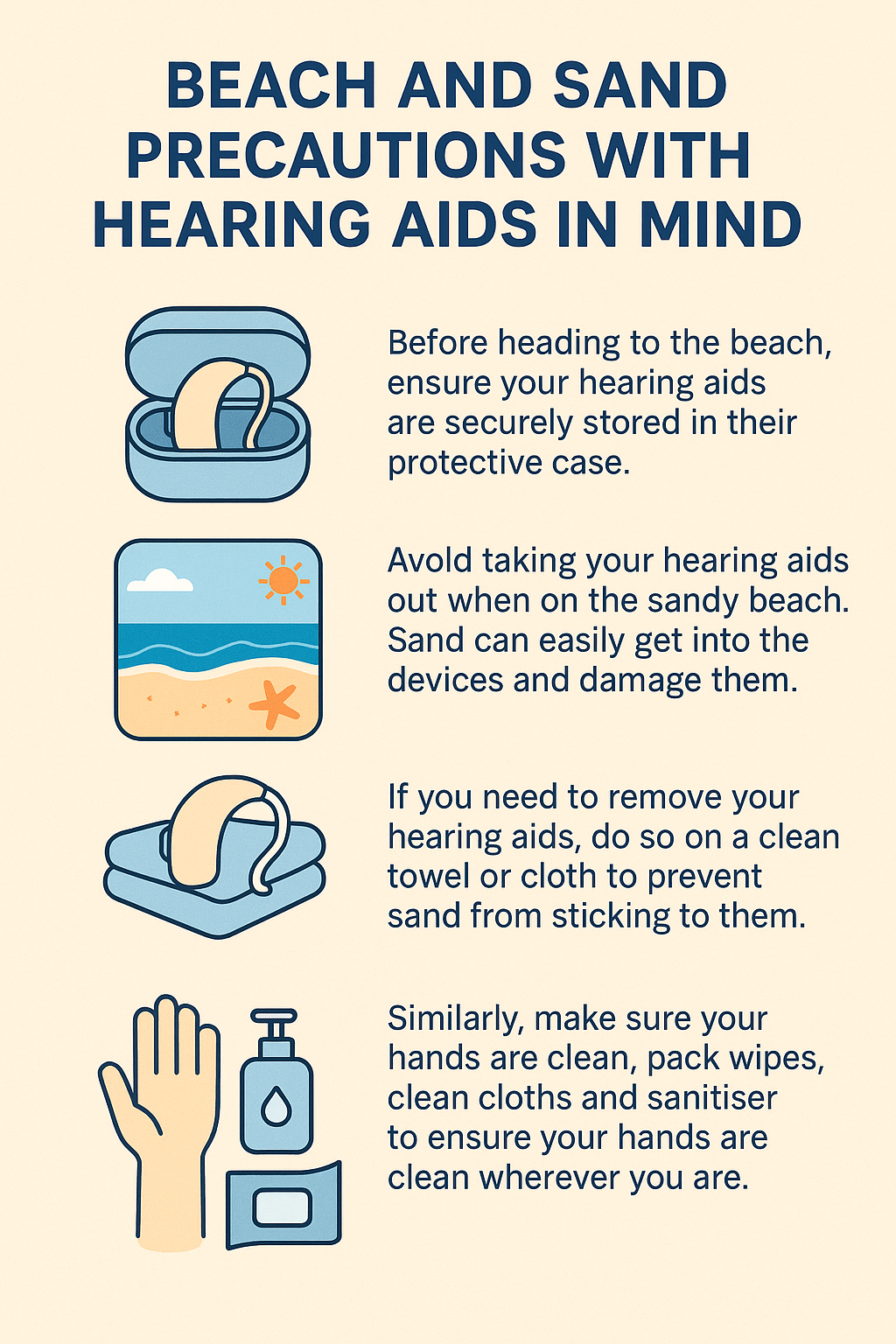
Beach and sand precautions with hearing aids in mind:
- Before heading to the beach, ensure your hearing aids are securely stored in their protective case.
- Avoid taking your hearing aids out when on the sandy beach. Sand can easily get into the devices and damage them.
- If you need to remove your hearing aids, do so on a clean towel or cloth to prevent sand from sticking to them.
- Similarly, make sure your hands are clean, pack wipes, clean cloths and sanitiser to ensure your hands are clean wherever you are.
Sand is genuinely one of the biggest enemies of hearing aids. Even a tiny grain can cause problems, so it's worth being cautious. If you do get sand in your aids, don't try to blow it out - bring them to an audiologist when you return for professional cleaning.
General travel tips for those with hearing loss
Communication cards: Consider carrying communication cards that explain your hearing loss. These cards can be shown to people you interact with, such as hotel staff, taxi drivers, or tour guides, to let them know about your condition and how to best communicate with you.
You can even have these printed in the local language of your destination - "Please speak clearly, I wear hearing aids" in Spanish or Greek can be genuinely helpful.
Pre-book tours and attractions: When booking tours and attractions, inform the organisers about your hearing loss. They may be able to provide specific accommodations or ensure that tour guides are trained to communicate effectively with you.
Finally, make sure you have adequate insurance!: When securing travel insurance for your hearing aids, it's vital to assess the policy's coverage for your devices. Declare your hearing aids as high-value items when purchasing insurance and provide their specified value if required.
Confirm that the policy includes coverage for various circumstances, including loss, accidental damage, and theft of your hearing aids.
Additionally, ensure that your chosen policy offers worldwide coverage, protecting your hearing aids in both your home country and during international travel. These considerations help safeguard your hearing aids and provide peace of mind during your journeys.
Travel insurance is non-negotiable for expensive hearing aids. Standard travel policies often have limits that won't cover the full replacement cost of premium hearing aids, so check the fine print and upgrade if necessary. It's considerably cheaper than replacing lost or damaged aids out of pocket.
Key reminders for hassle-free travel:
- Pack more batteries than you think you'll need, plus all essential spares and cleaning equipment - these items can be difficult to source abroad.
- Request assistance when booking flights or trains - UK transport providers have comprehensive support systems in place, and using them makes travel considerably less stressful.
- Protect your hearing aids from sand, moisture, and humidity - different climates require different precautions, but a good protective case and portable dehumidifier cover most situations.
- Keep your hearing aids in during security checks and flights - you're allowed to wear them throughout, and it's safer than packing them away.
- Consider a Disabled Person's Railcard if you travel by train in the UK - it pays for itself quickly and provides savings for your companion too.
- Don't forget comprehensive travel insurance that covers your hearing aids' full replacement value.
Conclusion
In summary, travelling, wherever the destination, should be accessible to everyone, regardless of hearing loss. This comprehensive guide has provided you with invaluable insights, tips, and strategies to ensure your travels are smooth and enjoyable.
Whether it's packing essential items like spare batteries, cleaning kits, and protective cases, or navigating the challenges of air travel, airport security, and cruise trips, you can explore the world with confidence.
Why Choose Us?
- FREE Hearing Tests
- Best Hearing Aids and Prices
- FREE Aftercare for Life
- FREE Home Visits
- 200+ Local Audiologists
- 60 Day Money Back Guarantee
Worried about hearing loss holding you back?
Concerned that hearing loss might be limiting your experiences? Don't let it! Hearing aids can empower you to engage more fully with the world around you.
Feeling held back by hearing loss is a common worry, but it doesn't have to define your life.
Take the first step towards a world of improved hearing and enhanced experiences, call us free on 0808 253 5120 to speak with one of our team.
Other hearing loss awareness articles you might like...
 Hearing aid stigma
Hearing aid stigma 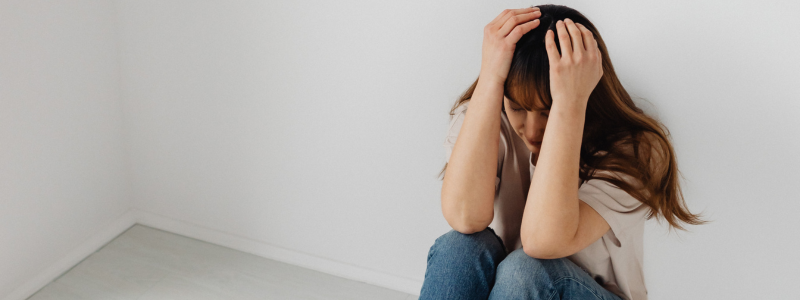 How to tell if hearing loss is permanent or temporary
How to tell if hearing loss is permanent or temporary 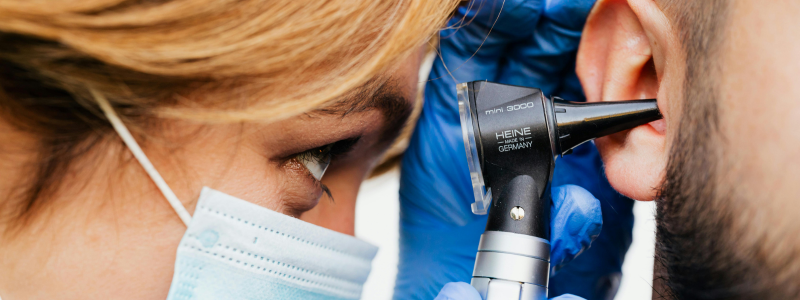 Ways to keep your ears healthy
Ways to keep your ears healthy Our specialist service includes:
Do not spend hundreds of pounds without getting a second opinion from us.
Please call us on 0800 567 7621
 Not only are the prices great, but the service is fantastic! Many thanks to your team.
Not only are the prices great, but the service is fantastic! Many thanks to your team.What's included in our hearing aid prices?
Common FAQs about hearing aids and hearing loss
In general, any audiologist will always recommend to you the hearing aid model that best suits your needs. Here is a useful checklist to make sure that is the case.
- Audiologist's level of knowledge: The audiologist you have seen will hopefully have a wide knowledge of all available hearing aids; however, some will only be familiar with a small number of brands and, therefore, may not really be in a position to know which model is the best for you. It is OK to challenge their recommendation and ask them to justify why this particular brand is the one for you.
- Do research: Read about the hearing aid that was recommended. Does it seem like it will suit your lifestyle? Does it have more or fewer features than you need?
- Be aware of sales targets: Many high street retailers have specific tie-ins to a particular manufacturer/brand. The hearing aid they have suggested may still be the correct one for you, but do your research so that you know why they might have recommended it.
If you have significant hearing loss in both ears, you should be wearing two hearing aids. Here are the audiological reasons why:
Localisation: The brain decodes information from both ears and compares and contrasts them. By analysing the minuscule time delays as well as the difference in the loudness of each sound reaching the ears, the person is able to accurately locate a sound source.
Simply put, if you have better hearing on one side than the other, you can't accurately tell what direction sounds are coming from.
Less amplification is required: A phenomenon known as “binaural summation” means that the hearing aids can be set at a lower and more natural volume setting than if you wore only one hearing aid.
Head shadow effect: High frequencies, the part of your hearing that gives clarity and meaning to speech sounds, cannot bend around your head. Only low frequencies can. Therefore, if someone is talking on your unaided side, you are likely to hear that they are speaking, but be unable to tell what they have said.
Noise reduction: The brain has its own built-in noise reduction, which is only really effective when it is receiving information from both ears. If only one ear is aided, even with the best hearing aid in the world, it will be difficult for you to hear in background noise as your brain is trying to retain all of the sounds (including background noise) rather than filtering them out.
Sound quality: We are designed to hear in stereo. Only hearing from one side sounds a lot less natural to us.
Fancy some further reading on this topic? You can read about why two hearing aids are better than one in our article, hearing aids for Both Ears, here
For most people, the main benefit of a rechargeable hearing aid is simple convenience. We are used to plugging in our phones and other devices overnight for them to charge up. Here are some other pros and cons:
For anybody with poor dexterity or issues with their fingers, having a rechargeable aid makes a huge difference, as normal hearing aid batteries are quite small and some people find them fiddly to change.
One downside is that if you forget to charge your hearing aid, then it is a problem that can't be instantly fixed. For most, a 30-minute charge will get you at least two or three hours of hearing, but if you are the type of person who is likely to forget to plug them in regularly, then you're probably better off with standard batteries.
Rechargeable aids are also a little bit bigger and are only available in Behind-the-Ear models.
Finally, just like with a mobile phone, the amount of charge you get on day one is not going to be the same as you get a few years down the line. Be sure to ask what the policy is with the manufacturer's warranty when it comes to replacing the battery.
For most people, the answer is yes. But it's never that simple.
The majority of hearing problems affect the high frequencies a lot more than the low ones. Therefore, open fitting hearing aids sound a lot more natural and ones that block your ears up can make your own voice sound like you are talking with your head in a bucket. Therefore, in-ear aids tend to be less natural.
However, the true answer is we can't tell until we have had a look in your ears to assess the size of your ear canal, and until we have tested your hearing to see which frequencies are being affected.
People with wider ear canals tend to have more flexibility, also there are open fitting modular CIC hearing aids now that do not block your ears.
There is also the age-old rule to consider, that a hearing aid will not help you if it's sat in the drawer gathering dust. If the only hearing aid you would be happy wearing is one that people can't see, then that's what you should get.
Most people can adapt to any type of hearing aid, as long as they know what to expect. Have an honest conversation with your audiologist as to what your needs are.
Generally speaking, six or more. Unless it's none at all. The number of channels a hearing aid has is often a simplistic way an audiologist will use to explain why one hearing aid is better than another, but channels are complex, and it is really not that straightforward. Here are some reasons why:
Hearing aids amplify sounds of different frequencies by different amounts. Most people have lost more high frequencies than low, and therefore need more amplification in the high frequencies. The range of sounds you hear is split into frequency bands or channels, and the hearing aids are set to provide the right amount of hearing at each frequency level.
Less than six channels, and this cannot be done with much accuracy, so six is the magic number. However, a six-channel aid is typically very basic with few other features and is suitable only for hearing a single speaker in a quiet room. The number of channels is not what you should be looking at; it's more the rest of the technology that comes with them.
As a final note, different manufacturers have different approaches. One method is not necessarily better than any other. For example, some manufacturers have as many as 64 channels in their top aids. Most tend to have between 17 and 20. One manufacturer has no channels at all.
Manufacturer's warranties typically last between 2-5 years, depending on the brand and model, and cover defects in materials and workmanship. This includes repairs for component failures, electronic malfunctions, and manufacturing defects, but excludes damage from misuse, accidents, or normal wear. Most manufacturers also include loss and damage insurance for the first year.
We handle all warranty claims on your behalf, liaising with manufacturers and ensuring you get replacement devices quickly when needed. This comprehensive warranty coverage, combined with our lifetime aftercare, gives you complete peace of mind.
Our hearing tests are completely free, whether at our clinics or in your home. Unlike other providers who charge £30-£100 for home visits, we believe hearing healthcare should be accessible without financial barriers. Our comprehensive assessments include examination by a registered audiologist, audiogram results, and personalised recommendations.
All testing, future adjustments, and ongoing support are included at no extra cost. While NHS tests are also free, typical 6-week waiting periods often lead people to seek immediate private testing. We provide prompt, professional assessments that fit your schedule and budget.
Yes, we offer completely free home visits throughout the UK, and this service is included in our prices with no additional charges. Home visits are particularly valuable for people with mobility issues, busy schedules, or those who simply prefer the comfort and convenience of their own environment.
Our audiologists can conduct full hearing tests, fit hearing aids, and provide ongoing support in your home. This service sets us apart from many providers who either don't offer home visits or charge extra for them.
We can offer prices up to 40% lower than high street retailers because of our business model. As a network of 200+ independent audiologists, we don't have the massive overheads of large retail chains - no expensive high street premises, no sales targets pushing audiologists to sell the most expensive options, and no costly marketing campaigns.
However, we maintain the same buying power as the big chains because we purchase on behalf of our entire nationwide network. This means you get access to the same premium hearing aids with professional service, but at genuinely competitive prices.
We offer a comprehensive 60-day money-back guarantee, which gives you twice the industry standard time to properly assess whether your hearing aids are right for you. This extended period recognises that adjusting to hearing aids takes time, and your brain needs several weeks to adapt to the amplified sounds.
Unlike many providers who offer just 30 days, we believe 60 days gives you the confidence to test your hearing aids in all the situations that matter to you - from quiet conversations at home to busy restaurants and outdoor activities.
Other pages you might find useful
Ask the Experts
6 Morton Lane
Walkwood
Redditch
Worcestershire
B97 5QA
Latest Launch
When we refer to a product as 'Latest Launch', we mean it is the latest to be released on the market.
New
When we refer to a product as 'New', we mean that the product is the newest hearing aid model on the market.
When we refer to a product as 'Superseded', we mean that there is a newer range available which replaces and improves on this product.
Older Model
When we refer to a product as an 'Older Model', we mean that it is has been superseded by at least two more recent hearing aid ranges.
